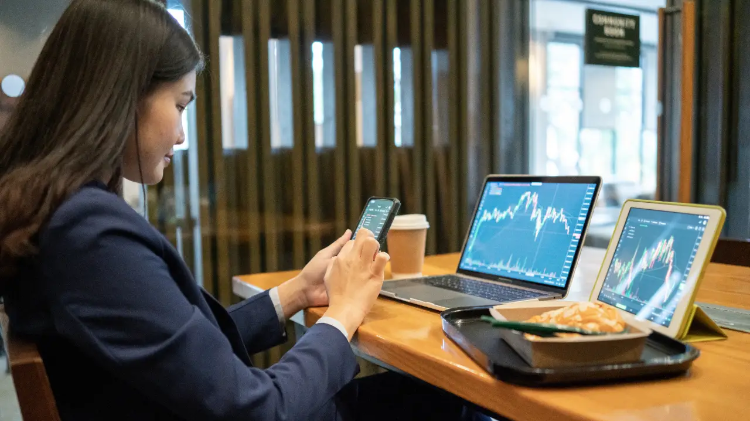The Psychology of Risk: Why Traders Win or Lose Before They Even Start

Trading is more than charts, numbers, or market trends, it also revolves around how the human mind reacts to uncertainty. Every trader, whether a professional or a complete beginner, is admittedly influenced by psychological biases, emotions, and decision-making under pressure. Some rush into trades, driven by excitement or fear of missing out, while others hesitate, paralyzed by uncertainty. In reality, most trading mistakes happen before a position is even opened. The way traders perceive and manage risk is actually what determines their long term success.
Why Risk Feels Bigger Than It Is
Risk is never absolute; it’s deeply personal. What seems like a reckless gamble to one trader might feel like a well calculated opportunity to another. This perception isn’t always based on logic, it’s shaped by past experiences, external market noise, and emotional responses. Consider Bitcoin’s early years. Many dismissed it as too risky when it was trading below $100, yet those who understood risk differently saw its long term potential. The same pattern plays out in everyday trading. Some investors avoid volatility entirely, missing out on opportunities because they overestimate the risk, while others jump in too quickly, failing to recognize potential losses. The key is not to eliminate risk only but to frame it correctly before making decisions.
The Emotional Cycle of Trading
Markets are shaped by human emotion. Traders experience cycles of excitement, panic, and regret, often making decisions that are more emotional than rational. When prices rise, confidence turns into overconfidence, leading traders to take unnecessary risks. When markets drop, fear takes over, and panic-selling replaces rational strategy. Once the opportunity is missed, regret kicks in, and many traders chase rallies too late or jump back in at the wrong moment.
-
Euphoria leads to overconfidence. Traders take bigger risks after a winning streak.
-
Fear causes hesitation. When markets dip, many traders panic-sell instead of holding steady.
-
Regret results in poor decision-making. Traders who missed out on a rally often chase price spikes too late.
This cycle repeats endlessly. The key to breaking it? Recognizing these emotions before they affect decision-making.
How Overtrading Drains Success
Another challenge traders face is overtrading, not because they see great opportunities, but because of impatience, boredom, or the urge to recover losses. More trades don’t necessarily mean better results. Every additional position increases exposure to risk, adding to stress and making it harder to maintain a clear strategy. Over time, this mental fatigue leads to exhaustion, forcing decisions based on impulse rather than analysis. What’s worse, unnecessary trading costs accumulate over time, making profitability even harder to sustain. This is where zero commission trading can have a real impact. While it doesn’t change trader psychology, removing additional fees allows traders to focus on strategy rather than feeling pressured to trade excessively to offset costs. Reducing these external pressures makes it easier to approach the market with discipline.
Managing Risk Without Letting It Take Over
Risk is part of every trade, but staying in control is what separates successful traders from those who struggle. The key is having a clear plan before entering a trade. Making decisions based on hype or emotions leads to second-guessing when the market moves unexpectedly. A smarter approach is to define risk and reward upfront, knowing exactly how much you’re willing to lose and what you aim to gain. Keeping risk at 2% or less per trade helps protect capital, making it easier to recover from losses.
Using stop-loss and take-profit levels keeps emotions in check. A stop-loss prevents small losses from turning into major setbacks, while a take-profit locks in gains before market conditions change. The mistake many traders make is setting these levels too close to the entry price, only to get stopped out by normal market fluctuations. It’s better to base them on key technical levels or market structure, ensuring they serve their purpose without cutting trades short too soon.
Patience plays a bigger role in trading than most realize. Many feel pressure to always be in the market, but overtrading increases risk, drains focus, and often leads to poor decision-making. Some of the best trades come from waiting for the right setup instead of forcing a move.
The market will always be unpredictable, but risk doesn’t have to be. Sticking to a structured plan, controlling losses, and avoiding emotional decisions helps traders stay in the game for the long run.
Remember, Trading Is a Mental Game
Mastering risk isn’t about eliminating it. The best traders learn how to control it without letting it control them. Recognizing emotional biases and resisting impulsive decisions will have a greater impact on long term results than any single trade. The market will always involve uncertainty, but those who understand how to perceive risk and respond rationally are the ones who navigate it best.